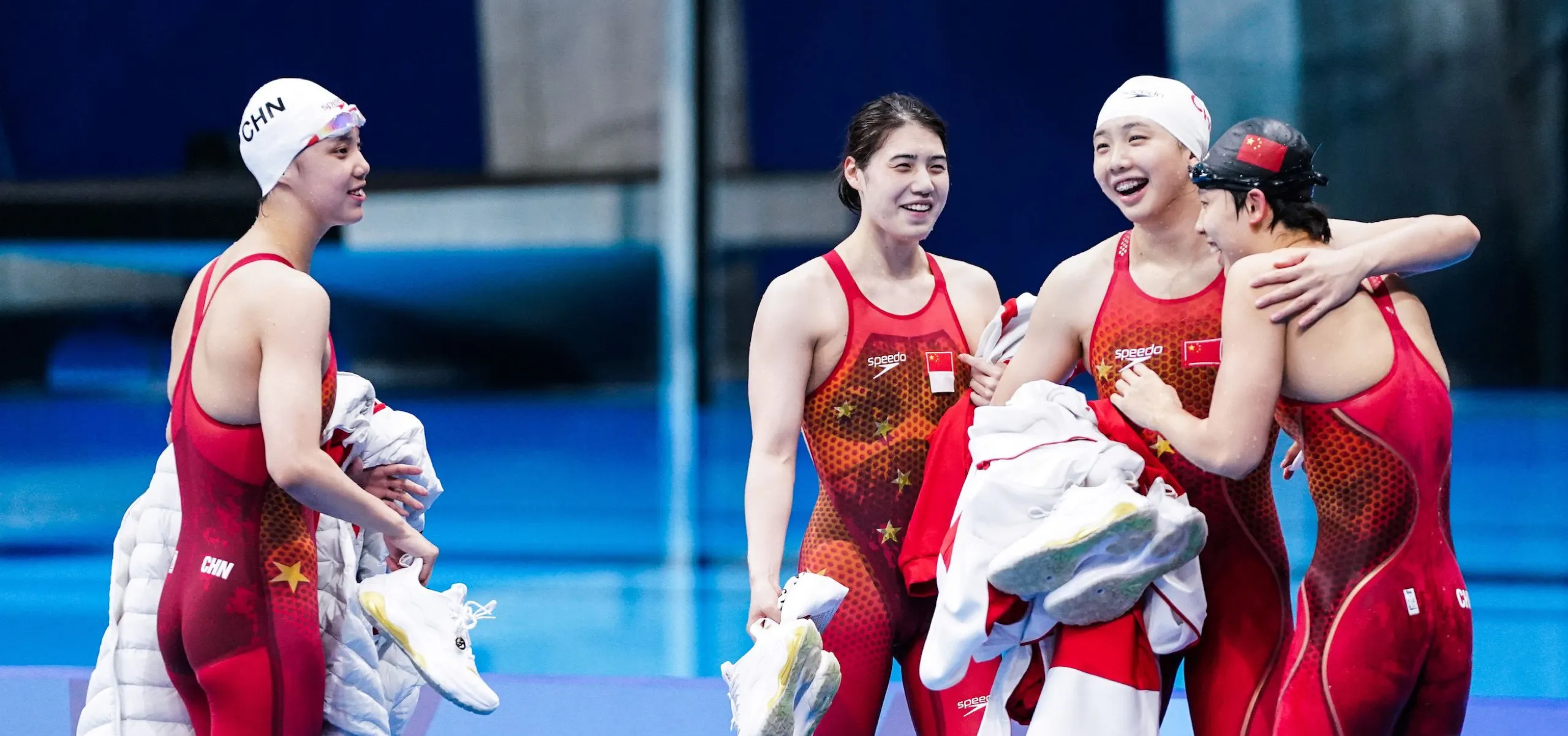A Chinese language guide to cheering on your team and dealing with defeat
Delayed by a year and held without a live audience due to the continuing Covid-19 pandemic, the 2020 Olympic Games in Tokyo has nevertheless attracted legions of "melon-eating masses (吃瓜群众 chīguā qúnzhòng, onlookers)" worldwide to tune in to the competitions, celebrate athletes' wins, and kvetch about the scores.
Chinese media and netizens are no exception, congregating online every day to cheer on their team and comfort themselves about losses. Here are some useful words and phrases to remember if you want to join in the conversation:
Before the match
At the start of each event of the Olympics, announcers and TV commentators will usually try to drum up excitement for spectators by implying that the Chinese athletes have a chance to win gold, known as 摘金 (zhāijīn, "pick up gold") or 夺冠 (duóguàn, "snatch the championship"). Experienced competitors may be expected to defend their title (卫冕 wèimiǎn) or even achieve a "grand slam (大满贯 dàmǎnguàn)"—winning all the major competitions in their sport—with an Olympic victory. Amazingly, Chinese table tennis player Ma Long achieved both when he defended his gold medal in the men's singles competition on July 30, becoming the only men's table tennis player in history to win a grand slam twice.
This afternoon at 2, Team China will defend their title in diving. Come on!
Xiàwǔ liǎng diǎn, Zhōngguóduì tiàoshuǐ xiàngmù jiāng yào wèimiǎn guànjūn. Chōng ya!
下午两点,中国队跳水项目将要卫冕冠军。冲鸭!
Seasoned Chinese sports fans often refer to teams using nicknames (as do celebrity fans for their idols). The national women’s football team, for example, is called the “Iron Roses (铿锵玫瑰 kēngqiāng méiguī)” due to its unlikely victories in the 1990s. Though the team hasn't been able to recover its past glories nowadays, the athletes are still praised for their strong fighting spirit.
The Chinese women's football team are “Iron Roses.” Victory is bound to be yours! Go “Iron Roses,” go Team China!
Zhōngguó nǚzú shì “kēngqiāng méigui,” shènglì bì jiāng shǔyú nǐmen!Jiāyóu “kēngqiāng méigui,” jiāyóu Zhōngguóduì!
中国女足是“铿锵玫瑰”,胜利必将属于你们!加油“铿锵玫瑰”,加油中国队!
In some events like badminton and table tennis, where Chinese athletes dominate, netizens may wish that both players in the final come from China:
In the all-important gold-medal group tournament, the goal of the Chinese badminton teams is play each other so they can sweep the gold and silver medals for China.
Zuòwéi Zhōngguó yǔmáoqiúduì zuì zhǔyào de duójīndiǎn, liǎng duì Zhōngguó zǔhé de mùbiāo shì huìshī juésài, wèi Zhōngguóduì tíqián bāolǎn jīnyínpái.
作为中国羽毛球队最主要的夺金点,两对中国组合的目标是会师决赛,为中国队提前包揽金银牌。
Dealing with defeat
During past Olympics, Chinese netizens have been criticized for their obsession with gold medals and their toxic behavior even toward athletes who win silver or bronze. This year, though, led by mainstream media, the online discourse have been surprisingly more rational when Chinese athletes lose. The national women's volleyball team, winner of the 2016 Olympics and several World Championships, shocked and dismayed viewers at home during the first week of the Games by suffering three straight defeats in the small-group tournaments. Many fans, though, declared:
The women’s volleyball team will always be the best in my heart. Come on! Show other teams your real strength!
Sīháo bù yǐxiǎng tāmen zài wǒ xīnzhōng de dìwèi, jiāyóu nǚpái, ràng shìjiè jiànshi jiànshi Zhōngguó nǚpái de zhēnshí shílì!
丝毫不影响她们在我心中的地位,加油女排,让世界见识见识中国女排的真实实力!
Netizens may also jokingly blame themselves for athletes' defeats:
Team China always loses when I tune in to watch! I've held the nation back from becoming champions!
Wǒ yí kàn bǐsaì Zhōngguóduì jiù shū! Wǒ dānwù guójiāduì duóguàn le!
我一看比赛中国队就输!我耽误国家队夺冠了!
As Chinese netizen’s confidence grows with the growth national power, however, perhaps counting gold medals will soon be a thing of the past, and comments like the following will become more common:
The Olympic spirit is all about participation. You are all the best!
Àoyùn jīngshen zhòng zài cānyǔ, nǐmen dōu shi zuì bàng de!
奥运精神重在参与,你们都是最棒的!
Swooning over stars
Winning (and losing) in the Olympic Games aren't just matters for the country, but the athletes themselves, who go through years of hard training and go all-out for those medals. When they succeed, fans may celebrate along with them by exclaiming, "好样的 (hǎoyàng de, so good)," "太帅了 (tài shuài le, so cool)," or even just "稳 (wěn, steady)!" When table tennis player Sun Yingsha defeated Japan's Mima Ito in the women's singles semifinals, after the Chinese team suffered a shocking defeat earlier in the week by Ito and her partner Jun Mizutani in the mixed doubles tournament, Weibo erupted in ecstasy:
I love Sun Yingsha’s strong recovery; she gained eight straight points with composure.
Wǒ xǐhuan Sūn Yǐngshā de bàqì nìzhuǎn, liánzhuī bā fēn, chénzhuó yìngzhàn!
我喜欢孙颖莎的霸气逆转,连追八分,沉着应战!
Nicknames are another way Chinese netizens show affectation for their favorite athletes. When swimmer Zhang Yufei grabbed two consecutive gold medals in the women’s 200-meters butterfly and 4x200 freestyle relay finals, Chinese viewers nicknamed her as the “swimming butterfly (雨蝶 yǔdié)” and "flying fish (霏鱼 fēiyú)”—the latter is one of many puns using the sounds of Zhang's name:
Zhang's last 50-meter sprint was so cool! The gold is surely yours!
Zuìhòu wǔ shí mǐ de chōngcì tài shuài le! Jīnpái fēinǐ mòshǔ!
最后50米的冲刺太帅了!金牌“霏”你莫属!
Ah, the controversies
Where sports are being played, controversy is never far away. For Chinese fans, the most common way to complain about perceived unfairness in scoring is to accuse the referee or judges of being blind:
What I find most touching from these Games is not the athletes who fight on despite losing the title, but the referees who stick to their post despite losing sight in both eyes.
Běnjiè Àoyùnhuì shang zuì lìng wǒ gǎndòng de, bú shì nàxie wèi dé jiǎngpái réngrán pīnbó de yùndòngyuán, érshì nàxie shuāngmù shīmíng yīrán jiānshǒu zài gǎngwèi shàng de cáipànmen.
本届奥运会上最令我感动的,不是那些未得奖牌仍然拼搏的运动员,而是那些双目失明依然坚守在岗位上的裁判们。
They might also vent more philosophically:
The Olympic spirit of justice and fairness is ruined.
Gōngzhèng de Àolínpǐkè jīngshen, dào zhèli quán chéngle bǎishe.
公正的奥林匹克精神,到这里全成了摆设。
Sports controversies, at least, have the chance of uniting an online community like nothing else. In the face of disputed Olympic results, netizens can usually put aside their petty squabbles and claim their country's athlete was robbed, as one. As an online saying goes, “We celebrate together when we win, and fight together when we lose (赢了一起狂,输了一起扛 Yíngle yìqǐ kuáng, shūle yìqǐ káng).”












